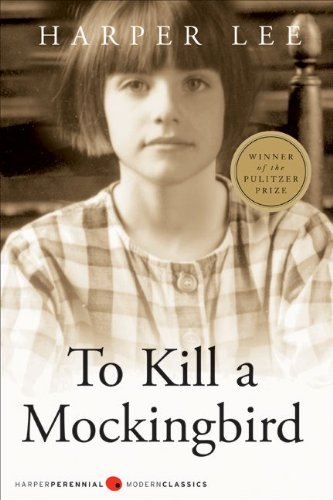All Nonfiction
- Bullying
- Books
- Academic
- Author Interviews
- Celebrity interviews
- College Articles
- College Essays
- Educator of the Year
- Heroes
- Interviews
- Memoir
- Personal Experience
- Sports
- Travel & Culture
All Opinions
- Bullying
- Current Events / Politics
- Discrimination
- Drugs / Alcohol / Smoking
- Entertainment / Celebrities
- Environment
- Love / Relationships
- Movies / Music / TV
- Pop Culture / Trends
- School / College
- Social Issues / Civics
- Spirituality / Religion
- Sports / Hobbies
All Hot Topics
- Bullying
- Community Service
- Environment
- Health
- Letters to the Editor
- Pride & Prejudice
- What Matters
- Back
Summer Guide
- Program Links
- Program Reviews
- Back
College Guide
- College Links
- College Reviews
- College Essays
- College Articles
- Back
To Kill a Mockingbird by Harper Lee
To Kill a Mockingbird, originally published in 1960, is a timeless, historical-fiction novel written by Harper Lee. Lee was born in 1926 in Monroeville, Alabama, a Southern town similar to the book’s fictitious town of Maycomb, Alabama. Events in Lee’s life significantly influenced the events and characters in the book. For instance, the Scottsboro Boys Trial, in which nine African American boys were arrested on the charges of raping two white women, had a large impact on Lee; consequently, To Kill a Mockingbird owes part of its plot to this event in history. In addition, Lee’s father, a lawyer and state legislator, was the basis of the character of Atticus Finch, an attorney and legislator, as well. Truman Capote, Lee’s longtime childhood friend, was the inspiration for the character of Charles Baker “Dill” Harris; like Capote, in the story, Dill lives mainly with relatives because of trouble at home.
Told through the innocent eyes of a young girl, To Kill a Mockingbird is a novel showing the events in a small Southern town leading surrounding the trial of a black man falsely accused and convicted of raping a white girl. As the story progresses, the two main characters grow and mature as they learn about the world, both through the events and by observing their father.
Fatherhood is an underlying theme that Lee shows by contrasting three different types of fathers: Atticus Finch, Walter Cunningham, and Bob Ewell. Atticus Finch is everything a father should be: kind, understanding, respectful, and polite. Early on in the book, Scout says, “Jem and I found our father satisfactory: he played with us, read with us, and treated us with courteous detachment” (6). By the end of the book, however, Jem and Scout learn that their father is a constant, reliable figure, whose devotion to his children is evidenced by Scout’s realization that, “‘Atticus Finch is the same in his house as he is on the public streets’” (51) Mr. Cunningham is a poor, honest, but racist man who lives on the outskirts on Maycomb. Despite his shortcomings, he teaches his son, Walter, the importance of manners and independence. While Atticus may be a wonderful father and Mr. Cunningham a flawed one, Mr. Ewell is the worst kind of father; he is often drunk, neglectful, and abusive. He also tries to raise his social standing by falsely accusing Tom Robinson of raping his daughter, Mayella.
On the whole, the book To Kill a Mockingbird is outstanding because, through different types of fathers, it offered more insight into the adage, “You can’t judge a book by its cover;” at the end of the book, Scout says, “Atticus, he was real nice,” to which Atticus replies, “Most people are, Scout, when you finally see them” (323). However, just like all books, there are some low points. For example, the reader tires of author’s use of long passages to describe background or history; in chapter nine, Lee spends too much time describing Finch’s Landing, which was tedious, beginning, “Finch’s Landing consisted of three hundred and sixty-six steps down a high bluff and ending in a jetty” (91). Though these passages added some background to the book, they were boring to read. Another element of the book that was wearisome is Aunt Alexandra’s opinions about “Fine Folks”: “She never let a chance escape her to point out the shortcomings of other tribal groups to the greater glory of our own” (147). On the other hand, the author’s use of humor livens up an otherwise serious book; for example, when Jem and Scout create a snowman, Miss Maudie calls it a “hermaphrodite”, but Scout hears “morphodite” instead and says, “You mean the morphodite? Shoot, we can rake him up in a jiffy” (84). In addition, one of the more interesting parts of the book was the trial, especially Atticus’ closing speech:
We know all men are not created equal in the sense some people would have us
believe- some people are smarter that others, some people have more opportunity
because they’re born with it, some men make more money than others, some
ladies make better cakes than others- some people are born gifted beyond the
normal scope of most men…Our courts have their faults, as does any human
institution, but in this country, our courts are the great levelers, and in our courts
all men are created equal. (233)
All in all, To Kill a Mockingbird was an extremely enjoyable read. It is no wonder that this novel won a Pulitzer Prize and that many consider it one of the best novel of the twentieth century.
Similar Articles
JOIN THE DISCUSSION
This article has 3 comments.

